Compulsory education 'costing islanders thousands'
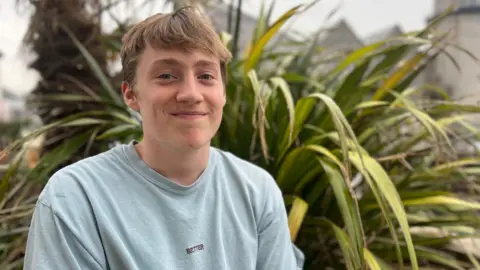 BBC
BBC"It's pretty inconvenient," says 18-year-old Jacob Mallon of the 19-hour journey between his home in the Isles of Scilly and the college he has been attending for the past two years.
It is a trek he made up to 12 times a year, involving a plane, a bus, a hotel, a train and a taxi and it is not only inconvenient - it is also costly.
The islands are one of only two local authority areas in England with no sixth-form provision and as a result, his family say they are now in £20,000 of debt after sending their son to a state-run boarding college in Winchester.
The Isles of Scilly Council says other options are available, including cheaper host families but campaigners are concerned about the safety of children living in unregulated accommodation.

In 2015 it became a legal requirement for young people in England to stay in education, training or employment until 18.
In recent years, there have been between 15 to 32 Scilly children in each post-16 year group, with two year groups completing their sixth form education at any one time.
Children in the City of London - the only other local authority with no post-16 provision - can get a bus or tube to a nearby provider but island children have no choice but to travel to the mainland.
Where they live during this time is causing tensions between the council and parents - and it can also come as a culture shock to the young islanders.
"I have to get the boat or the plane, if I get the boat it gets in quite late so I have to stay the night in Penzance, then it's a six or seven hour train to Winchester," says Jacob, who has just finished his college studies.
Before starting college, the longest time he had spent off Scilly was about two weeks: "I'm used to walking down the road and knowing everyone but on the mainland, I don't know anyone and it's a bit weird."
Accommodation options include staying with host families, costing about £9,000 a year; boarding, with the nearest state boarding costing £16,500 per year - or imposing on mainland family and friends.
This does not include travel or other incidentals and families say the sums have been increasing "exponentially" as the cost of living goes up.
Parents can get a grant - increasing this year to £9,635 - to help with travel and accommodation costs.
Jacob's mother Samantha Mallon says: "Any raise in the money is welcome, but it's still so far short of what we need and it's not addressing the safeguarding issues."
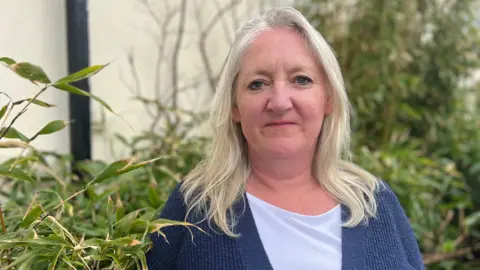
The grant is made up of £8,000 from the government, administered by the council, and a top-up from the council but parents say it does not cover any of the options.
Some told the BBC they had spent their life savings on boarding fees, while others say they have taken two jobs to pay the bills.
Mrs Mallon says she worries about safety.
"You don't know who's coming in and out of the house," she says.
"Some of the families are great and that's brilliant but most people will say they've been lucky and it shouldn't come down to luck with children."
Jacob says he thinks it is "unfair" Scilly young people "have to come away and there isn't really any other opportunities for us".
"We just don't get enough funding for what we need," he says.
"I've had conversations with mates who've had bad times and they've had to change host families because they've been kicked out.
"Most [young] people don't have to figure out where they're gonna live but obviously quite a lot of people from Scilly do."
Child 'became very ill'
The council says it supports host families by funding Disclosure and Barring Service (DBS) certificates but while several hosts have taken up the offer, it remains optional.
In a March meeting, councillors heard how an anonymous child "became very ill with type 1 diabetes" while living in host family accommodation, but "nobody noticed [them] lose 10kg over the course of a six-week half term when [they were] away from home".
The council says "there are no records" of any referrals to children's services about children living with host families.
It adds since Ofsted found its safeguarding practices to be inadequate, it has "improved significantly" and had changes of leadership.
The BBC can reveal an anonymous teenager brought a judicial review against the council but it has since been withdrawn after an agreement between the parties.
In March, High Court judges approved the agreement, which included the council agreeing safeguarding concerns were a relevant consideration when determining the level of funding.
It also agreed to pay the claimant's legal fees.
The council says it offered a resolution at an earlier stage and it "regrets that such action was taken".
For the campaigners the result is "disappointing" and they are looking at their next legal options.
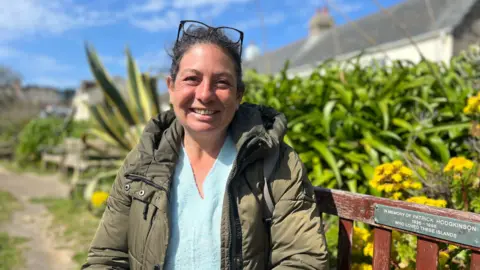
Mother-of-two Jenny Bhadha is preparing to send her 15-year-old to the mainland in September.
"I do not feel happy or safe moving him into a family home that we've never met and don't know from Adam," she says.
Mrs Bhadha says she considered breaking up her family to move with her son to Devon – the fees for boarding accommodation simply out of the question.
Her son will be staying with a family friend in Plymouth while attending college there.
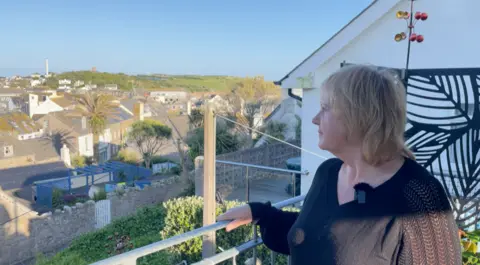
In January, former councillor Anita Bedford said she was resigning from the Isles of Scilly Council over the matter.
"I felt that the number one goal was to protect the organisation [council] at any cost," she says.
"I actually listened to councillors and officers saying, 'this is just a few precious mums who want to send their children to private boarding at the cost of £30,000 a year paid for by the taxpayer' - that was being spun, not just in meetings, but it was being spun within the community."
She adds her own time in host family accommodation "was not a good experience" and as a consequence, she funded her two children to go to state boarding.
"We wanted that environment, not just for the education, but that 24-hour wraparound," she says.
The council says it takes safeguarding of children and spending public money "very seriously", adding Ms Bedford's reasons for resigning were personal to her.
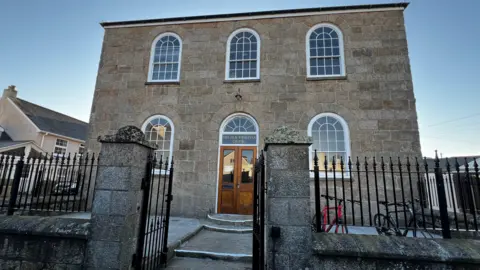
When the BBC went to St Mary's, very few parents were willing to publicly comment on the matter, with some saying they fear losing their jobs with the council - one of the island's main employers.
The council says staff with children can discuss their concerns with their management "without any fear of disciplinary action".
The BBC understands September 2025 will be the second time the council has contributed to the grants away from the government funds, the first was the previous year.
In 2022 the council asked the government for £15,715 per pupil per year, which campaigners say they feel would be fair. This was declined with the new government saying it would look again in its next spending review.
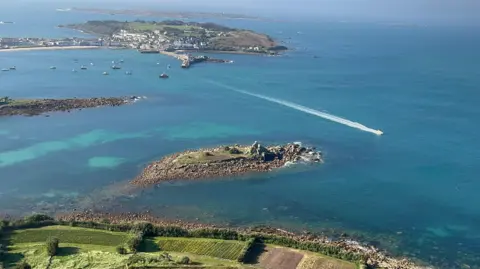
Statistics show Scilly has one of the highest proportions of 16 and 17 year olds not in education, employment or training.
"If [the council] can't afford to fund it... then they should be going back to the government which has made education up until 18 compulsory," Mrs Mallon adds.
"Parents shouldn't be subsidising the council or the government for what is their statutory duty."
The council says it will continue to make representations to central government to increase the level of funding and will write to the nearest state schools who offer boarding to ask for a discount for Isles of Scilly children in light of their "unique circumstances".
It gave its full support to host families saying they provide a "warm, welcoming and supportive home environment".
The Department for Education says it has increased funding to £8,000 for the coming year and adds: "This government is mission-driven to break down barriers to opportunity through our Plan for Change.
"We are committed to ensuring our post-16 education system gives young people the best life chances, whatever their background or postcode."
Additional reporting by Mark Edwards and David Dixon
Follow BBC Cornwall on X, Facebook and Instagram. Send your story ideas to [email protected].
